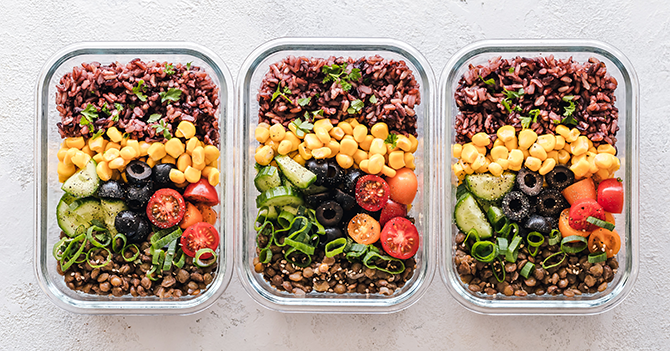Thriving on a Plant-Based Diet

Afra Kamal
Bachelor’s Student in Public Health
Whether you’re thinking about or already following a plant-based diet, it’s important to make sure you’re getting enough nutrients from a variety of different sources. Plant-based diets carry a host of health benefits and have been shown to reduce the risk of diseases like type 2 diabetes, heart disease, and high blood pressure.1 However, a diet that is free of or low in meat isn’t necessarily nutritionally sound, and can often cause nutrient deficiencies.
These deficiencies can be avoided by consuming a whole foods, plant-based diet that includes proper amounts of vegetables, fruits, whole grains, various types of protein, and healthy fats.
If you follow a plant-based diet, there are a few nutrients in particular to pay attention to and different plant foods that can help ensure you’re consuming enough macronutrients and micronutrients.
Vitamin D
Vitamin D plays an essential role in calcium absorption and maintaining bone health. For individuals who don’t absorb enough sunlight to synthesize enough vitamin D on their own, plant-based dietary sources include some mushrooms, fortified dairy products, and fortified cereals.2 Beyond food sources, a vitamin D supplement can help meet your dietary needs.
Iron
Iron plays an important role in transporting oxygen to cells through the bloodstream. A deficiency in iron often results from a lack of animal product consumption because the iron found in plants is less bioavailable than the iron in meat.3 However, if you follow a plant-based diet, you can still get enough iron by eating foods like leafy greens, legumes, whole grains, and dried fruits.
Vitamin B12
Vitamin B12 supports healthy red blood cells, brain and nervous system functioning, and cell division. Because almost all dietary sources of vitamin B12 come from meat and animal products, people who follow a plant-based diet typically do not take in enough of this essential vitamin.4 Foods such as fortified plant-based milks, yogurt, cereal, and nutritional yeast can help ensure that you’re taking in enough vitamin B12.2
Omega-3 Fatty Acids
These essential fatty acids, including ALA, EPA, AND DHA, are highly important for healthy immune, cardiac, and cognitive function.2 For pescatarians or ovo-vegetarians, eggs and fish are excellent sources of omega-3 fatty acids. For vegans, ALA can be found in flax, chia, and hemp seeds, as well as in kale and walnuts.5 Algae-based omega-3 supplements can provide adequate EPA and DHA.
Tips for Thriving on a Plant-Based Diet
The key to achieving optimal health on a plant-based diet is to maintain a balanced diet comprised of a diverse array of whole foods with minimal added sugar, refined grains, excess sodium, or unhealthy fats. A diet rich in whole, plant-based foods should provide more than enough of the macronutrients and micronutrients you need to thrive. With this is mind, maintaining a plant-based diet can help ensure that you live a long, healthy life.
References
- McEvoy, C, et al. (2012). Vegetarian diets, low-meat diets and health: a review. Retrieved from DOI: 10.1017/S1368980012000936
- Flink, T. (2018). 7 Nutrient Deficiencies You Can Avoid With a Vegan Diet. Retrieved from https://www.livekindly.co/7-nutrient-deficiencies-avoid-vegan-diet/
- Tuso, P. (2013). Nutritional Update for Physicians: Plant-Based Diets. Retrieved from DOI: 10.7812/TPP/12-085
- Oberst, L. (2017). 5 Key Supplements for Vegans and Vegetarians to Thrive on A Plant-Based Diet. Retrieved from https://foodrevolution.org/blog/supplements-vegetarians-vegans-plant-based/
- Barrington, K. (2018). The Top 5 Nutrient Deficiencies on a Plant-Based Diet. Retrieved from: https://www.naturespath.com/en-us/blog/the-top-5-deficiencies-on-a-plant-based-diet/
About the Author
 Afra Kamal is a third-year student pursuing her bachelor’s degree in Public Health
Sciences at the University of Michigan. She currently helps lead the student organization
Project Healthy Schools Global, a team that works to provide preventive health lessons
to students in developing countries within South Asia. When she’s not in class, she
enjoys going on runs, listening to podcasts, and cooking deliciously wholesome plant-based
food.
Afra Kamal is a third-year student pursuing her bachelor’s degree in Public Health
Sciences at the University of Michigan. She currently helps lead the student organization
Project Healthy Schools Global, a team that works to provide preventive health lessons
to students in developing countries within South Asia. When she’s not in class, she
enjoys going on runs, listening to podcasts, and cooking deliciously wholesome plant-based
food.
